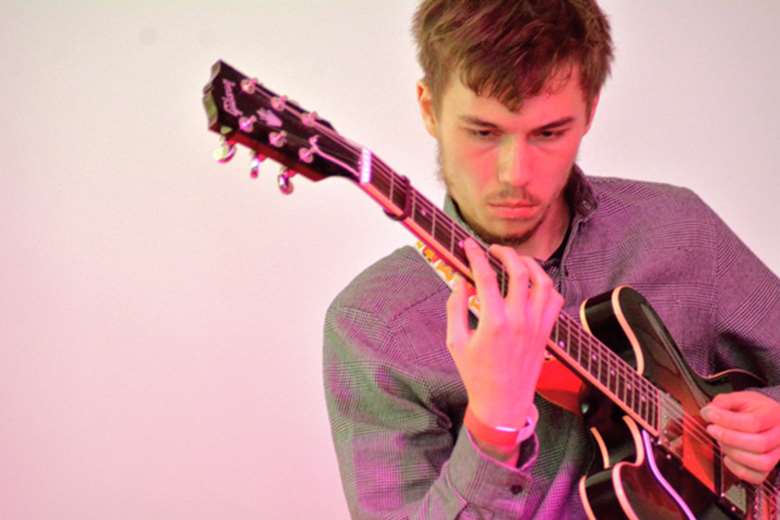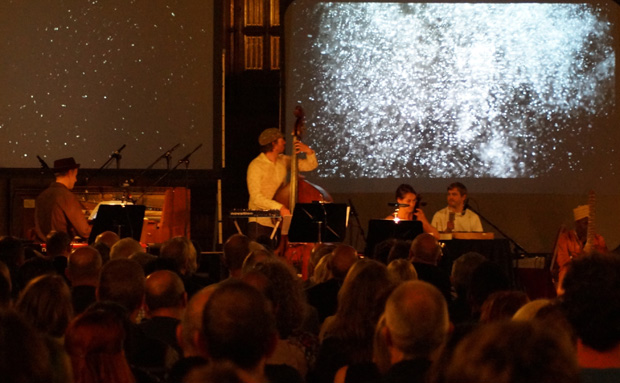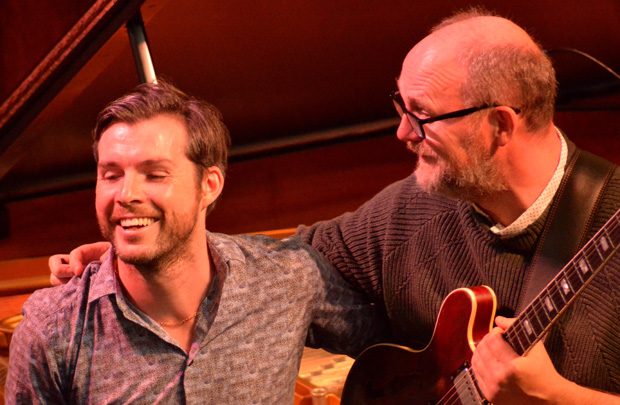Local acts light up the 20th Manchester Jazz Festival
Friday, August 14, 2015
Usually when a festival the size of Manchester reaches a major milestone they call in the cavalry – jazz titans like the Marsalis Brothers, Charles Lloyd or Chick Corea come to take care of the fireworks and help put up the bunting and what you get is a programme full of international heavy hitters.

But that’s not really the point of MJF and never has been.
This festival is less about bringing the world to Manchester and more about showcasing the best that the North West has to offer – which is saying a great deal. This is a city with a proud musical tradition after all – the home of Chetham's and the Royal Northern College of Music (RNCM), the Hallé Orchestra and the BBC Phil. It’s the parade ground of several of the UK’s most flawlessly twee brass bands and the indie hub that gave us Oasis, Elbow and The Smiths (which just about makes up for the Bee Gees).
Manchester’s jazz scene is one of enviable strength and depth and MJF’s programme has always been heavy on local bands with a view to flaunting and nurturing the city’s musical output. Though there were a smattering of international jazz stars on this year’s bill their sets certainly weren’t the highlights – at least during my visit, on the final weekend of the festival’s 10-day run.
I’m a huge fan of Robert Glasper. His duo performance with fellow Houstonian Jason Moran was one of the standout gigs at last year’s London Jazz Festival and I was privileged enough to watch his Experiment band play a blinder at the Sage Gateshead in 2013. His trademark blend of jazz, hip hop and R&B is one of the defining sounds of the past few years, one that has spawned legions of imitators and turned new audiences on to the tradition. Yet I found his MJF set, in front of a sell-out crowd at the RNCM, hard going.
The pianist took to the stage with his recently reformed trio of bassist Vicente Archer and drummer Damion Reid and the three men displayed impressive interactive powers across a series of tracks from latest album Covered, cut with Prince’s “Sign O’ The Times” and extended quotes from “Afro Blue” and “Till It’s Done (Tutu)”, by neo-soul pioneer D’Angelo. But on the whole the gig felt aimless and self-indulgent. Bursts of solo piano from Glasper lacked direction and the grooves were all on one level – laid back and lethargic. They would have made perfectly pleasant R&B beats, with a vocalist to add interest, and I wouldn’t have minded a bit if they’d been on the playlist at a house party, but as material for a sit down concert they left a lot to be desired.
Sunday’s set of ethereal soundscapes and indie pop-inspired originals from hotly-tipped French trumpeter Airelle Besson, winner of the Django Reinhardt Prize and this year’s French Jazz Musician of the Year, was also a little disappointing. Besson’s quartet played well enough, with vocalist Isabel Sorling contributing arcing lines that glowed like moon beams thanks to some subtle electronic enhancement. But the writing felt cluttered and the group’s strategy of allowing tracks to evolve organically (though perfectly sound if properly handled) made for a lot of wandering moments.
Gorka Benítez, a tenor player and flautist from the Basque Country representing Spain on behalf of the Manchester branch of the Instituto Cervantes, gave us an inspiring set full of Iberian flair and forays into free jazz that saved the away team’s blushes. But it was the local bands, and those with a local connection, who ensured that this anniversary went off with a bang.
I have my reservations about GoGo Penguin’s brand of jazz-inflected, acoustic dance music, which can be formulaic at times, but it’s hard not to be swept along by the energy and there was no doubting that the trio played up a storm, headlining the Thwaites Festival Pavilion on Friday night with tracks from v2.0 and their forthcoming debut for Blue Note. There's a primal quality to their melodies. Like a handprint on the wall of a cave, they awaken something within you and they get your pulse racing. The crowd was clearly delighted to see them back on home turf and greeted them with a thunderous roar.

Just as engrossing was the premiere of Evolution: Seeds and Streams, by Mancunian pianist John Ellis (above),who headlined the first Manchester Jazz Festival back in 1996. Part of the MJF Originals series of new commissions, it was a piece of gently-unfolding, understated beauty – drifting in a world of its own, somewhere between chamber music, jazz and ambient art rock. There were yawning, richly-voiced horn lines; tinkling kora grooves; pointillist, pizzicato strings; snatches of sampled bird song and whispered vocal sounds. Ellis added bulging sci fi synth lines and shivering piano commentaries played on an old upright that sounded as though it had been knocked about a little over the years. The insinuations of honky tonk and the squeak of the pedals only added to the surreal quality of the atmosphere.
The Neo-Gothic splendour of Manchester’s town hall was an inspired choice of setting and an animated backdrop by Antony Barkworth-Knight, full of arresting visuals, was the perfect complement to the music. There were shots of water that ran as thick as oil, muted colours bleeding into one another, stylised flocks of birds and a roving eye. Best of all were a series of hands over which the camera lingered, searching the contours of the palm and the topography of the knuckles, finding beauty in the mundane.
St Anne’s church, the setting for a graceful and wonderfully fluid duo performance from Salford-born guitarist Mike Walker and Chetham’s alumnus Gwilym Simcock (below), was similarly well chosen – particularly as the pair opened with an extract from Bach’s St Matthew Passion. As was the Central Library’s circular reading room, its domed ceiling reverberating with the lilting melodies of trumpeter Neil Yates’ whisper soft Surroundings suite, originally commissioned in 2010 and pared down for a quartet completed by saxophonists Iain Ballamy and Tori Freestone with pianist Les Chisnall.

\As well as demonstrating just how many of the British jazz establishment have ties to the North West, MJF does an excellent job of promoting lesser known acts from the region and there were a host of promising newcomers rubbing shoulders with the local boys and girls done good. The easy-going grooves and swaggering basslines of Afrika Jazz, a trio led by Congolese pianist and Birmingham Conservatoire student Tshepe Tshepela, ensured a laid back start to Friday’s programme and a performance from the Quarry Hillbillies proved an unexpected highlight. See a name like that and you fear the worst but don’t let it put you off. So called because they all teach at Leeds College of Music in Quarry Hill, the quintet take their playing seriously. Their set of contemporary, European jazz originals in the tradition of Kenny Wheeler and John Taylor was flawlessly polished, with plenty of inspiring improvised moments played out across merry-go-round chord sequences – the kind that swing you back to the top and feel like a dream to solo over. Once you’re on you never want to get off.
Drummer Jim Molyneux’s horn-heavy, Snarky Puppy-esque Glowrogues were another exciting discovery and a set of grungy, EWI-led jazz prog from young Leeds band, Stretch Trio (pictured top of page) was equally strong. Both groups would benefit from tightening up a few of their compositions, distilling them down to their essentials, but both have bags of promise and Glowrogues in particular have some killer hooks – choruses that make you want to throw your head back and shout “Choon!” They were on stage again for the festival’s after party at Northern Quartet club Band on the Wall, where they shared the bill with Kalakuta, a group of RNCM students and alumni whose set of high energy Afro Beat was similarly outstanding.
Walking back along Tib Street and through the city centre that night, past boarded-up boozers and livelier ones done out in red brick and glazed tile, I was in no doubt that I’d seen Manchester at its best and it hardly seemed to matter that the weekend’s overseas guests hadn’t lived up to their billings. Homegrown talent provided all of the fireworks this superb twentieth anniversary celebration needed.
– Thomas Rees @ThomasNRees
– Photos by Weiting Huang and Peter Woodman